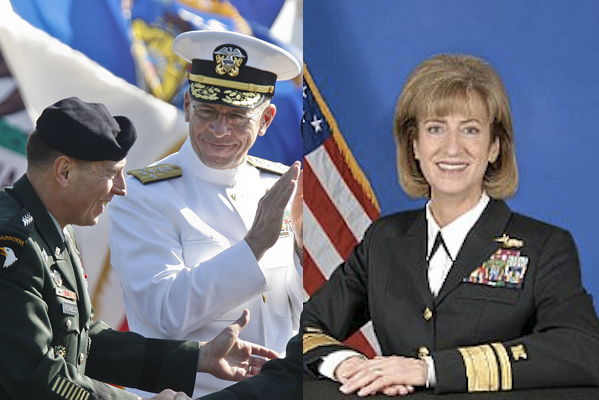Military Task Force Tackles Thorny Issue of Contractors in Afghanistan
Task Force 2010 was conceived by Gen. David Petraeus and Adm. Mike Mullen and is led by Rear Adm. Kathleen Dussault. (St. Petersburg Times/ZUMA Press, navy.mil)
It has an uncertain budget, a team of fewer than two dozen military officers and civilians, and barely a year to make its mark on counterinsurgency in Afghanistan before the U.S. begins its transfer of security responsibilities to Afghans. In that time, a new military task force will attempt to get a handle on one of the thorniest aspects of the way the U.S. military fights its wars: its relationship with the small army of contractors it hires for support.
[Security1] The brainchildof Gen. David Petraeus, the commander of U.S. forces in the Middle East and South Asia, and Adm. Mike Mullen, the chairman of the Joint Chiefs of Staff, the new task force in Afghanistan, known as Task Force 2010, will “follow the money,” as Petraeus testified to a Senate panel on Wednesday, to ensure that billions of dollars’ worth of Pentagon contracts dispersed to U.S., Afghan and foreign companies don’t end up in the hands of U.S. adversaries or otherwise subvert U.S. strategy.
Task Force 2010 is led by Rear Adm. Kathleen Dussault, a longtime Navy logistics officerwho served as senior contracting overseer when Petraeus commanded the U.S. war in Iraq. Dussault arrived in Kabul last week after meeting the week before with John Brummet, the head of audits for the Special Inspector General for Afghanistan Reconstruction, for a briefing on “forensic audits,” something Brummet described as a “data-mining effort to look at financial transaction data” for “various anomalies” indicating waste, fraud or abuse.
While it’s too new to have a specific agenda delineated yet, U.S. officials who would not speak for attribution described Task Force 2010 as focusing on the intersection of contractor money and political power in southern Afghanistan, and giving senior military officers a greater amount of visibility into murky networks of subcontractors using taxpayer dollars than they currently have. Among its areas of focus are the private security companies outside of the U.S. military command’s operational control whose independent activities have sometimes proven problematic for the U.S. in Afghanistan. The task force has established an Armed Contractor Oversight Division to help advise Stanley McChrystal, the commanding general of U.S. and NATO forces in Afghanistan, on how to deal with the companies.
“It’s not just about illegal activity for this task force,” said a U.S. military officer familiar with Task Force 2010′s work. “There’s also perfectly legal activity undercutting what we’re trying to do in Afghanistan. Whether it’s prime [contractors] or subs, getting down to power brokers and money lords, it’s absolutely undercutting what we’re trying to do.”
Expect to hear the term “power broker” a lot with regard to Task Force 2010. It’s a politically neutral euphemism for one of the most complex problems that the U.S. faces in Afghanistan, and particularly in southern Afghanistan: how U.S. contract money entrenches local political dynasties, some of which raise or hire independent security forces and can have transactional relationships with the Taliban. Some use their contract money to consolidate their hold on power by providing jobs, thereby emerging as potential obstacles to the overarching U.S. strategy of expanding the Afghan government’s reach, capability and relevance, which McChrystal considers pivotal for securing U.S. interests in the country.
The most important of those power brokers is Ahmed Wali Karzai, the chairman of the Kandahar Provincial Council and the brother of Afghanistan’s president, Hamid Karzai. Ahmed Wali Karzai is widely believed to be a “facilitator” of the opium trade in the south— and a recipient of CIA money. A May 28 report from the Institute for the Study of War co-authored by Kimberly Kagan, an adviser last year to McChrystal, warned that an impending consolidation of private security companies under Ahmed Wali Karzai’s control “compete[s] with state security forces and interfere[s] with a government monopoly on the use of force,” and also undercuts the development of the Afghan National Army and Police. But in a Washington appearance with Secretary of State Hillary Rodham Clinton last month, Hamid Karzai said that the U.S. understood his brother is simply a political fact of life in Kandahar.
U.S. military officials said that Task Force 2010 did not yet have any agenda for what contracts it will study, only an ethic for investigative diligence. It will be “following subcontracting networks wherever they lead, provide that information to the battlespace owner and Gen. McChrystal, and they make a decision about what to do,” said the military officer. In keeping with its early focus on southern Afghanistan, the officer said that the task force will seek to “make as many improvements as possible by the September/October time frame,” aligned with McChrystal’s plan to provide a “rising tide” of security for Kandahar ahead of July 2011, when the U.S. will gradually begin to transition security responsibilities for Afghan control.
Task Force 2010 will synthesize information “already collected” on private security contractor networks in Afghanistan, the officer said, and will “absolutely be linked in to the intelligence community,” but it is “not an intelligence gathering agency.” The task force will have civilian members, including from the FBI, and contributors from international agencies as well. It it unclear if the CIA will contribute any personnel to the task force.
The task force will seek to collaborate with the Afghan government and international bodies. But the U.S. military officer said that it did not have a mandate to reduce corruption within the Afghan government. “We want to improve contracting on our side of things, so when Gen. McChrystal approaches the Afghan government [on corruption] it’s from a position of credibility,” the officer said. “No one here is saying ‘stamp out corruption.’ We’d love to, but corruption was here before the international community arrived [in Afghanistan], and unfortunately, it’ll be here afterward.”
Southern Afghanistan and private security contractors won’t be the only focus of the new task force. It will also seek to understand the murky network of contractors that aid with the training and equipping of the Afghan National Security Forces, the centerpiece of the Obama administration’s post-2011 strategy for securing the country. Earlier this year, a Senate investigation discovered that a shell company established by Blackwater, one of the most infamous private security contractors, diverted hundreds of rifles for its guards’ personal use that were intended for the Afghan police, and other contractors opened fire on Afghan civilians on a Kabul road.
“Any effort that neglected to look at the training effort would miss big part of the puzzle,” the officer said, so Task Force 2010 will “absolutely” examine contractor contributions to the U.S. and NATO training command.
But Task Force 2010′s most immediate task will be to trace the influence of U.S. contract money to help McChrystal execute his strategy, something politically perilous if it threatens the Afghan “power brokers” with whom the U.S. has worked in the south.
“Who knows what we’ll find?” said the military officer. “We see our job as providing information to decision-makers on how we do contracting. Absolutely, there could be large political implications to what we find — there may or may not be.”

